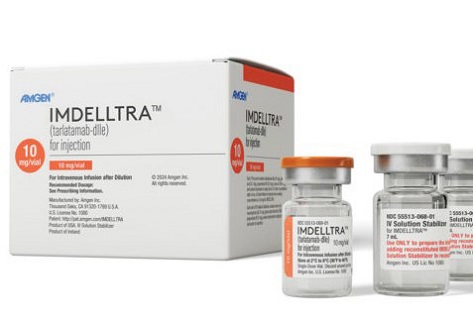A New Hope In Deadly Lung Cancer Treatment: FDA Approves Amgen's Tarlatamab (Imdelltra)
Nikhil Prasad Fact checked by:Thailand Medical News Team May 19, 2024 11 months, 1 week, 1 day, 53 minutes ago
Cancer News: The landscape of lung cancer treatment has experienced a significant breakthrough with the U.S. Food and Drug Administration (FDA) approving a new drug, Tarlatamab, branded as Imdelltra, developed by Amgen. This drug offers a glimmer of hope to patients suffering from extensive-stage small cell lung cancer (ES-SCLC), particularly those who have exhausted all other treatment options. This
Cancer News report delves into the significance of this approval, the efficacy and safety of Tarlatamab, and its implications for the future of lung cancer therapy.
 U.S. FDA Approves Amgen's Tarlatamab (Imdelltra)
A Pivotal Approval
U.S. FDA Approves Amgen's Tarlatamab (Imdelltra)
A Pivotal Approval
Last Thursday, the U.S. FDA announced the approval of Tarlatamab (Imdelltra) for treating patients with advanced ES-SCLC. This approval is a milestone, offering a new treatment avenue for a condition that has seen minimal advancements over the past decades. Dr Jay Bradner, executive vice president of research and development and chief scientific officer at Amgen, emphasized the importance of this approval, stating, "Imdelltra offers these patients who are in urgent need of new innovative therapies hope, and we're proud to deliver this long-awaited effective treatment to them."
The DeLLphi-301 Trial: A Beacon of Hope
The approval of Imdelltra was primarily based on the results of the pivotal DeLLphi-301 study. This Phase 2 clinical trial evaluated Tarlatamab in patients with SCLC who had failed two or more prior lines of treatment. The trial demonstrated impressive results, with a 40% objective response rate (ORR), a median duration of response (DoR) of 9.7 months, and a median overall survival (mOS) of 14.3 months.
Dr David P. Carbone, professor of internal medicine and director of the James Thoracic Oncology Center at the Ohio State University Medical Center, highlighted the significance of these results. He noted, "In the DeLLphi-301 trial, the median overall survival was 14.3 months, with 40% of patients responding to treatment with Tarlatamab. These responses were remarkably durable, representing a major advancement in the SCLC treatment paradigm."
The Mechanism of Action
Imdelltra is the first and only DLL3-targeting bispecific T-cell engager therapy. It activates the patient's own T cells to attack DLL3-expressing tumor cells. This innovative mechanism sets it apart from traditional treatments and offers a new approach to targeting and eliminating cancer cells.
Patient Impact and Experiences
The impact of Tarlatamab on patients with ES-SCLC is profound. With small cell lung cancer typically spreading beyond the lung by the time of diagnosis, standard treatments, including chemotherapy combined with immunotherapies, have historically offered limited extensions in survival, often adding just two months to patients' lives. Patients in the Amgen trial, who had already undergone two or even three rounds of chemotherapy, reported a significant improvement in their l
ife expectancy and quality of life with Tarlatamab.
Laurie Fenton Ambrose, co-founder, president, and CEO of GO2 for Lung Cancer, expressed her optimism about the new treatment option. She stated, "After decades of minimal advancements in the SCLC treatment landscape, there is now an effective and innovative treatment option available. Today's FDA approval marks a significant milestone for the SCLC community as the availability of a targeted bispecific therapy brings forward new possibilities to those living with this aggressive disease."
Safety and Side Effects
While Tarlatamab has shown remarkable efficacy, it is not without its side effects. The FDA has issued a boxed warning for cytokine release syndrome (CRS) and neurologic toxicity, including immune effector cell-associated neurotoxicity syndrome (ICANS). CRS is a serious condition where the immune system goes into overdrive, causing symptoms such as rash, rapid heartbeat, and low blood pressure. Other common adverse reactions reported among patients included fatigue, pyrexia, dysgeusia, decreased appetite, musculoskeletal pain, constipation, anemia, and nausea. However, these side effects were generally manageable with supportive care, and permanent discontinuations due to treatment-emergent adverse events were infrequent (7%).
Future Directions and Ongoing Trials
The FDA's approval of Tarlatamab is based on accelerated approval, contingent upon the verification and description of clinical benefits in confirmatory trials.
https://www.fda.gov/drugs/resources-information-approved-drugs/fda-grants-accelerated-approval-tarlatamab-dlle-extensive-stage-small-cell-lung-cancer
This means that while the initial results are promising, further research is required to confirm the long-term efficacy and safety of the drug.
Amgen is committed to conducting these confirmatory trials to ensure that patients continue to benefit from this innovative treatment.
https://www.amgen.com/newsroom/press-releases/2024/05/fda-approves-imdelltra-tarlatamabdlle-the-first-and-only-tcell-engager-therapy-for-the-treatment-of-extensivestage-small-cell-lung-cancer
Dr Anish Thomas, a lung cancer specialist at the National Cancer Institute, who was not involved in the trial, reflected on the approval as a beacon of hope. "I feel it's a light after a long time," he said, underscoring the potential of Tarlatamab to change the trajectory of ES-SCLC treatment.
Conclusion
The FDA's approval of Tarlatamab (Imdelltra) represents a significant advancement in the treatment of extensive-stage small cell lung cancer. This new drug offers hope to patients who have exhausted all other options, providing a much-needed innovative therapy in a landscape that has seen little progress over the years. While there are safety considerations to be mindful of, the overall benefits and potential of Tarlatamab make it a promising option for patients and healthcare providers alike. As further research and confirmatory trials continue, the medical community remains hopeful that Tarlatamab will pave the way for more effective and targeted cancer treatments in the future.
For the latest
Cancer News, keep on logging to Thailand Medical News.
